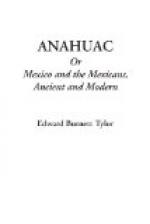Mexico, as everybody knows, is decidedly a thievish place. The shops are all shut at dark, after the Oracion, for fear of thieves. Ladies used to wear immense tortoise-shell combs at the back of their heads, where the mantilla is fastened on; but, when it became a regular trade for thieves to ride on horseback through the streets, and pull out the combs as they went, the fashion had to be given up. These curiously carved and ornamented combs are still preserved as curiosities, and we bought several of them.
While we were in Mexico, they knocked a man down in the great square at noon-day, robbed him, and left him there for dead. The square is so large, and the sun was so hot, that the police—whose head-quarters are under the arches in that very square—could not possibly walk across to see what was going on!—moral, if you will have the distinction of having the largest square in the world, you must take the consequences.
Of course, where thieving is so general, the market for stolen goods must be a place of considerable trade, and this Baratillo is one of the principal depots for such wares. One may realize here the story of the citizen, in the old book, who had his wig stolen at the beginning of his walk through London, and found it hanging up for sale a little further on. Here the deserter comes to sell his uniform and his ricketty old flintlock. Small blame to him. I would do the same myself if I were in his place, and were compelled to serve under one rascally political adventurer against another rascally political adventurer—to say nothing of being treated like a dog, half-starved, and not paid at all, except by a sort of half license to plunder. “Those poor soldiers! we can’t pay them, you know, and they must live somehow.”
I have abused the Mexicans for being thieves, and not without reason, though, as regards ourselves personally, we never lost anything except a great brand-new waterproof coat which my companion had brought with him, promising to himself that under its shelter he should bid defiance to the daily rain-storms of the wet season. As we dismounted from the Diligence in Mexico, in the courtyard of the hotel, some one relieved him of it. We did not know of the Baratillo in those days, or would have gone to look for it there. At the time of our visit it was too late, for if it ever had been there, the Mexicans understand too well the value of an English “ulli,” as they call them, to let it hang long for sale. “Ulli” is not a borrowed word, but the genuine Aztec name for India-rubber, which was used to make playing-balls with, long before the time of Columbus.




